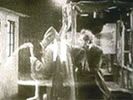Eye For Film >> Movies >> The Phantom Carriage (1921) Film Review

It is New Year's Eve, and a consumptive Salvation Army sister named Edit (Astrid Holm) sits up from her deathbed and mysteriously demands that one David Helm be sent for at once. Yet when the man (Victor Sjöström), a misanthropic and abusive alcoholic, is eventually found carousing by a cemetery, he spurns Edit's 11th-hour intervention on his behalf, refusing even to see her – and, as the clock strikes midnight, he is accidentally struck dead.
Not that death is the end – for in this ghostly morality tale, the first person to die in the New Year is doomed to drive the phantom carriage for the next annual cycle – a grisly, punishing existence reaping lost souls for the afterlife. Before handing over the reins, the incumbent driver Georges (Tore Svennberg) – a man once well known to David – takes his reluctant successor on a tour through time, showing him the error of his ways and the damage that his life of dissipation has wrought on other people, including David's brother (Einar Axelsson), wife (Hilda Borgström) and two young children – not to mention on pious Edit herself. At last, for the first time in years, David's conscience is pricked – but is it too late for him to redeem himself?

Victor Sjöström's silent horror The Phantom Carriage (Körkarlen) draws directly from the 1912 novel of the same name by Nobel Prize winner Selma Lagerlöf, while also channeling the spirit of Charles Dickens' 1843 novella A Christmas Carol. A deadly serious parable of irresistible temptation, moral despair and the possibility of change, Sjöström's film has been remade twice, as Julien Duvivier's La charette fantôme (1939) and Arne Mattsson's Körkarlen (1958), as well as clearly inspiring Frank Capra's It's A Wonderful Life (1946), whose cheery optimism it haunts like a dark doppelganger.
Without question, though, the filmmaker whose work has been most influenced by this classic is Sjöström's fellow Swede Ingmar Bergman, who would replay the film's encounters between 'hero' and Reaper in The Seventh Seal (1957), who would cast Sjöström himself as a man looking back over the emptiness of his life (and, in a dream sequence, meeting Death) in Wild Strawberries (1957), and who would dramatise a meeting between Sjöström and Lagerlöf to view some finished scenes from The Phantom Carriage in what was to be Bergman's penultimate film, the teleplay The Image Makers (2000). That Bergman, arguably one of the greatest filmmakers of all time, should have been so impressed by a film made when he was only three years old, attests to to the enduring impact and timeless universality of The Phantom Carriage.
It would be all too easy to reduce The Phantom Carriage to a piece of propaganda for the temperance movement, but that would be to overlook its rather sophisticated suggestion that addiction might be as much a symptom as a cause of societal ills. It would be easy, too, to dismiss the film as a mere showcase for "special effects" – and certainly its use of double exposures and match cuts to create the illusion of phantom activity is most striking – but that would be to ignore altogether both its ethical convolutions and the complexity of its narrative, whose flashback-within-flashback structure expands the events of an hour or so into the events of several years. And it would be simplicity itself to ignore The Phantom Carriage as an unwanted ghost from a forgotten and (to today's tastes) rather clunky period of cinema, but the cast (led by Sjöström himself) put in performances much closer to modern realism than silent-era histrionics, while the crispness of Julius Jaenzon's cinematography can speak to any age.
What is more, Sjöström's film is not just an early horror, but an argument for the moral validity of cinema itself. For just as David's limbic carriage ride, whether supernatural reality or stupor-driven vision, reveals to him the value of turning over a new leaf, Sjöström's film has the same effect on the viewer. Here, it is cinema itself which is the phantom carriage, taking us on a journey that can divert, horrify and depress – but also enlighten and improve. The film may still bear some of the outmoded stylisations of the silent era, but its message survives the test of time and, as we learn along with the vice-ridden protagonist, never comes too late.
Reviewed on: 12 Feb 2008


















